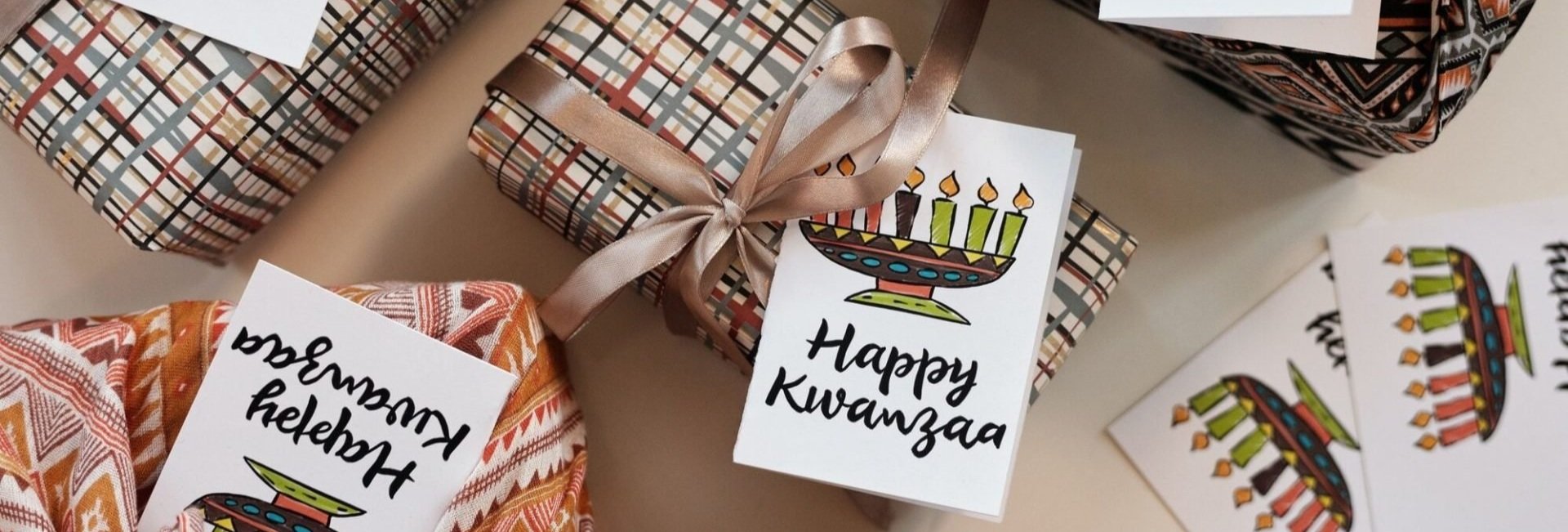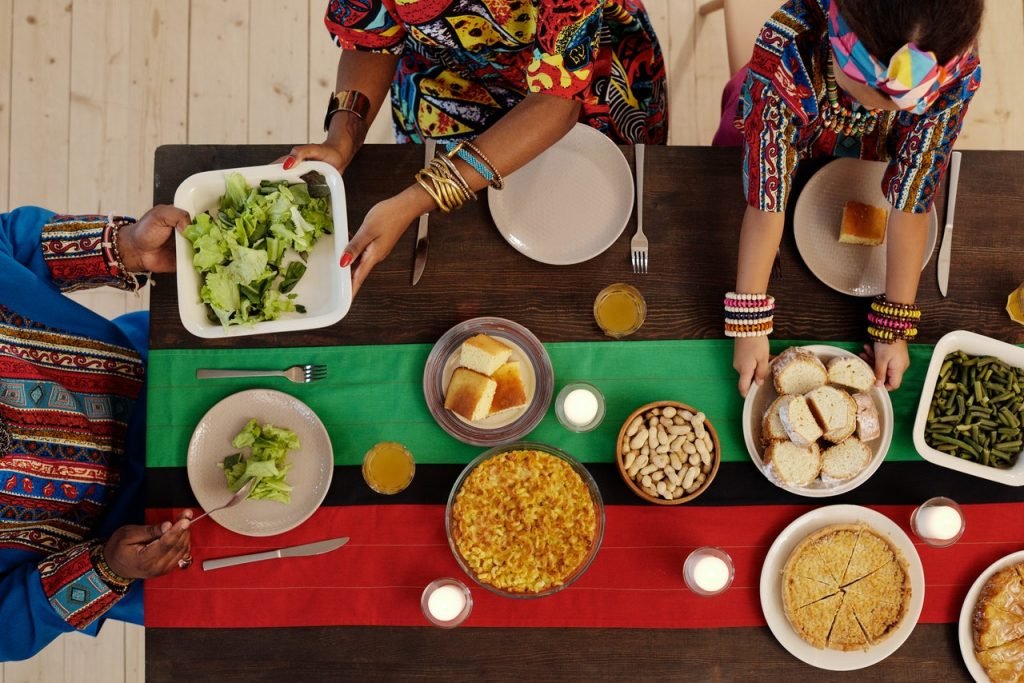Celebrating Culture with Kwanzaa!
Discover > Texas Mom Blog > Celebrating Culture with Kwanzaa!
If you thought Christmas and Hanukkah are the only two holidays this time of the year, get ready for another reason to celebrate!
Kwanzaa meaning "first" in Swahili, signifies the first fruits of the harvest. Every year, from December 26 to January 1, many people of African descent in America commemorate Kwanzaa.
While Kwanzaa isn't a religious holiday, it's a meaningful time of festivity and togetherness for the African American culture and community. And TexasRealFood is all for that. So, let us take this opportunity to honor the bountiful festival of Kwanzaa.
Did you know that learning is in fact a part of Kwanzaa? Well, now you do. What a great way to begin!
Where Did Kwanzaa Originate From?
Maulana Karenga, a professor, activist, and chairman of Black studies at California State University, believed that despite there being many ethnic customs that hail the harvest time in Africa, the African American community did not echo the same sentiment. In order to create stronger and wholesome African communities in America, in 1966, Prof. Karenga advocated to observe Kwanzaa. And that’s how it came to be!
So, How Do We Celebrate Kwanzaa?
In Africa, villages come together to honor and give thanks for their prosperity. Working towards a successful harvest is a collective effort, as is the commemoration.
Kwanzaa is an opportunity to reflect on our use of the basic principles, share and enjoy the fruits of our labor, and recommit ourselves to achieving a better life for our family, our community, and our people.
Kwanzaa is celebrated in many different ways, but festivities often include storytelling, songs, dance, and a large, hearty meal with the ones you love.
Rituals of Kwanzaa
Kwanzaa is observed differently by different groups of African people. However, the lineup events remain the same over the course of seven days.
Each day is dedicated to individual principles which are- Umoja (unity), Kujichagulia (self-determination), Ujima (collective work and responsibility), Ujamaa (cooperative economics), Nia (purpose), Kuumba (creativity), and Imani (faith).
People light a new candle on the Kinara every night, a seven-branched candelabra. These seven candles, which differ in color from black to red and green, signify the African people's struggle, land, and hope. The theme of each night is discussed among family and friends.
Culinary Traditions of Kwanzaa
Food forms an integral part of rejoicing the spirit of the African harvest during Kwanzaa. Specifically, two deeply symbolic foods are black-eyed peas (how long do black-eyed peas last?) and collard greens. Black-eyed peas represent good luck, while collard greens (how long do collard greens last?) point towards fortune. Most of the foods eaten during Kwanzaa are the ones that were brought to America via the Transatlantic slave trade such as yams, and peanuts, among others.
However, there are no such hard and fast rules on what can be eaten during Kwanzaa. People enjoy a wide variety of cuisines with African, Caribbean, South American, and Southern influences. Here are some of the popularly enjoyed foods during this holiday!
Jollof Rice (how long does rice last?): This African rice dish is as nourishing as it is simple. It’s cooked with crushed tomatoes, red onions, green peppers, hot pepper, spices, and veggie broth. It is commonly made with chicken or beef but tastes as great in its veggie version.
Sweet Potato Pie: A velvety sweet potato custard filled with heartwarming spices, baked on a buttery pie crust- what’s not to love?! A sweet potato pie at Kwanzaa is an essential staple that showcases the harvest of this versatile indigenous ingredient.
Collard Greens: Cooked in veggie broth and aromatics, collard greens have a deep, emotional relationship with the African American struggle. You can add a chicken broth to intensify the flavor or enjoy it as a vegan meal.
Candied Yams: Caramelized yams are usual accompaniments to mac ‘n’ cheese and collard greens in a Kwanzaa meal. Sliced and cooked in butter with sugar, spices, and vanilla extract, candied yams add some much-needed warmth to a chilly winter evening.
African Peanut Stew: Sign us up for a stew! The African peanut stew is a rich and hearty dish that hails African ingredients in an honest, no-frills manner. Chicken, peanut butter, tomato paste (how long does tomato paste last?), ginger, and fresh herbs are cooked together to create a melody of flavors that’s comforting and uplifting.
Southern Peach Cobbler: A dessert baked with fresh peaches; a Southern Peach Cobbler is a permanent feature at a Kwanza dinner table. Most Americans have grown up relishing this dish at a festive occasion or simply at Grandma’s.
Southern Fried Okra: A crunchy, fried okra dish is sure to be a crowd favorite. Southern Fried Okra is a classic African dish with okra coated with buttermilk. Seasoned cornmeal (how long does cornmeal last?), flour mix and deep-fried to a golden crunch.
Jamaican Beef Patties: These tempting patties are too good to be true! A curry-flavored pastry dough houses a sumptuous meat filling and is baked to flaky perfection. A sure shot hit on your Kwanzaa menu!
If you are wondering where in Texas you can find these mouth-watering dishes, check out our southern cuisine restaurants here!
For those of you who would like to go a step further and dive deep into the culinary art of cooking soul food for the holidays, we recommend, A Real Southern Cook: In Her Savannah Kitchen, and Jubilee (Recipes from Two Centuries of African American Cooking), two fabulous cookbooks to get you started!
If cooking a meal on Kwanzaa is not on the cards, fret not! You can always head out to a black-owned and operated restaurant and celebrate the festivities by extending them your support and patronship. Yo Mama’s Soul Food in Houston is one excellent option, and you can explore more at the TexasRealFood BIPOC-owned businesses directory here.
Fun Kwanzaa Events Happening in Texas
Searching for some local Kwanzaa fun to get tickets to? We got some for ya!
Dallas Public Library is hosting the 3rd Annual Jerry Pinkney Day and Kwanzaa Celebration. They have special guests, activities, gifts, and a whole lot more!
The CarverMuseumATX + Six Square are presenting the Ujamma Marketplace & Kwanzaa Celebration, on Wednesday, December 29, 2021. This year’s event will spotlight the 4th day of Kwanzaa Ujamma “cooperative economics” with a Buy Black Vendors’ Outdoor Marketplace from 4-6 pm followed by a grand community celebration from 7-8:30 pm in the Boyd Vance Theatre. Follow this link to book your place now!
This year, think about how you can ring in the holidays a little differently by keeping the spirit of Kwanzaa alive. Share your ideas with us in the comments section below!






